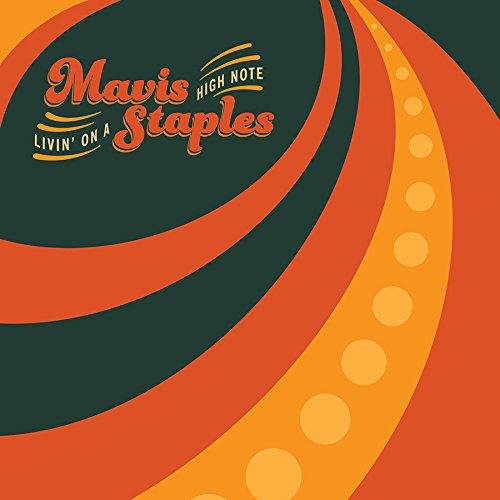
Mavis Staples
Livin' on a High Note
Release Date: Feb 19, 2016
Genre(s): R&B, Pop/Rock
Record label: Epitaph
Music Critic Score
How the Music Critic Score works
Buy Livin' on a High Note from Amazon
Album Review: Livin' on a High Note by Mavis Staples
Very Good, Based on 9 Critics
Based on rating 8/10
Mavis Staples is the latest in a very long line of legendary artists who get reinvented in the hands of younger admirers. Whether it’s Bonnie Raitt with Don Was, Bob Dylan with Daniel Lanois—hell, Darren Aronofsky dragging Mickey Rourke out of obscurity to nab an Oscar nomination—art is handed down through the generations and the payback can win new fans, new vitality, and hopefully a new relevance.The thing is, Mavis never really went away. Through her years with the Staple Singers, her solo career collaborating with Booker T.
Based on rating 7.5/10
"I've got friends and I've got family/I got help from all the people who love me.".
Based on rating 7.4/10
From her first performances as a teenager in the 1950s through her era-defining hits in the 1970s and even up to her Grammy-winning comeback albums with Jeff Tweedy, Mavis Staples has created some of the most joyous music ever. For her latest solo effort, however, she wanted something even more exuberant, even more celebratory—something in the vein of Pharrell Williams’ "Happy." "When I heard it, wow, it just lifted me up," she told the Guardian recently. "I told my songwriters I wanted songs just like that, that would make people smile, also because I’ve been making people cry for so long." Certainly Livin’ on a High Note sounds like a happy album.
Based on rating B
Mavis Staples has lived a life. Her songs dating back to her time with the legendary Staples Singers are more than just the best kind of soulful earworms, they’re words and notes painted from the front lines of one of the most contentious periods in American history. Hers is a name that’s earned its rightful place alongside the most powerful and relevant voices of the Civil Rights movement, and her words and music are as relevant today as ever.
Based on rating 3/5
There’s the feel of a Pitchfork lifetime achievement award about Mavis Staples’ 13th album, with a number of indie’s great and good, including Nick Cave and Bon Iver, writing the songs. No worthier candidate, of course: Staples’ voice accompanied the civil rights movement and inspired musicians from Bowie to Prince. But at times the music feels less like a tribute to her remarkable legacy than an exercise in smooth, award-ceremony funk.
Based on rating 6/10
The title of Mavis Staples' fourth studio album for the Anti- label could apply to any given point in the singer's career, but in early 2016 it seemed especially apt. Livin' on a High Note was released the week her version of Blind Lemon Jefferson's "See That My Grave Is Kept Clean" won a Grammy -- only her second -- in the category of Best American Roots Performance, and preceded the HBO premiere of the documentary Mavis! by a couple weeks. Staples was in the public consciousness as much as ever and was continuing to move in new directions.
Based on rating 3/5
Now 76, the youngest of the Staple Singers, whose voices soundtracked the civil rights movement, is still trying to do more. Her 13th solo album pairs her with producer M Ward and a host of contemporary writers, from Tune-Yards to Neko Case, in a bid for more “uplifting and joyful music” about friendship and survival. It doesn’t all come off. The Aloe Blacc-penned Tomorrow has a bit of the self-help manual about it, and Nick Cave’s Jesus, Lay Down Beside Me never quite lives up to the mischievous title.
Opinion: Fantastic
Mavis Staples is a soul-gospel legend, but her momentum keeps building as she targets the future. She just won a Grammy for a Blind Lemon Jefferson cover, but her latest album takes her to a new plateau enlisting contemporary songwriters such as Neko Case, Nick Cave, Ben Harper, Tune-Yards, Valerie June, and M. Ward (who also produced). It’s an inspired set that frames Staples’ emotionally raw, transcendentally intimate voice in mostly spare arrangements that cut to the heart.
Opinion: Fairly Good
With Livin' On A High Note, Mavis Staples set out to record an optimistic and joyful album. The soul icon turned to Portland singer/songwriter M. Ward for production, and a cast of indie rock stars to write songs. There's something strange about commissioning a bunch of mostly white musicians to write for someone whose history is so linked to the civil rights struggle, especially at this particular moment, but to the songwriters' credit, they all sound like they were eager to adjust their approaches to her style of gospel soul.
'Livin' on a High Note'
is available now

